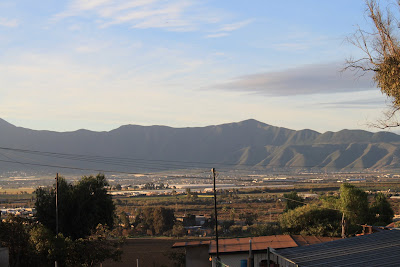She was married when she was not much older than me (21 0r 22), to a man she'd known for just a few months. It was a mistake, she'd later realize--he did not share her faith in Christ, and it did not take him long to leave his churchgoing wife behind for a life in "El Otro Lado," in a city in the US. She never told him that she was pregnant, and even still he knows nothing about their beautiful two-year-0ld daughter with the huge brown eyes and his curly dark hair.
When she first learned she was pregnant and very alone, she had no idea what to do. Eventually she ended up at the casa-hogar (shelter) where I met her--the animated young teacher of the supplemental classes for the kids at the shelter, with her 3-month-old daughter just a day younger than my own niece.
We became friends, sharing life at the casa for a little while--humorous communication (or sometimes miscommunication), stories about life, and the different changes and challenges of the classroom and Casa life. I would remember her as a particularly devoted mom and an enthusiastic & caring teacher who saw her work as ministry. Unlike many of the women that may pass through the Christian shelter purely by government placement, Mirna seemed to be a strong Christian, and did her best to be content with the time God had her there, despite trials or loneliness (many other women do not stay very long at the casa, so it can be hard to make stable friends) and the strong desire to make a real and independent life for herself and her daughter.
It had been more than a year that i had not been able to visit her, but she wrote to me sometimes and I also to her. But she wasn't sure she should believe that I would come again to see her. "Many people visit, and afterwards they write, and then eventually they forget," she said. "I figured you would probably be the same."
The minutes had passed so very slowly as I waited at the casa for Mirna to arrive home from work. In the mean time I spent some time with my "mexican niece" as we'd come to call her--who, as even the others in my group casually observed, seemed happier than many of the other kids, and obviously very well cared for. She'd grown quite a bit since I'd last seen her, and was even talking pretty well. Her eyes were bright and adventurous and she hardly stopped laughing as I pushed her in the swing and helped her climb and slide down the slide.
At last Mirna and I greeted one another and made our way to her room with Dina to do some much-overdue catching up. She excitedly showed me the little artificial Christmas tree she had set up and decorated in their room, the first one she or Dina ever had. But we had barely sat down when suddenly the group was waiting and I had to leave--it was my mistake for having failed to ask permission to stay earlier on. I think we were both devastated but I told her I would try to return, my heart feeling heavy and sick. This, after a year and a half? I couldn't do that to her... But I couldn't make any promises.
But lo, by God's grace and the goodness of our driver's heart, I returned at dark, after dinner. Most everyone was in their houses getting ready for bed, but someone told me that Mirna was in cleaning the kitchen. I walked quietly in, carrying all my things, and said teasingly, "I don't have a house... can I stay here with you?" She gave me a warm smile. "Oh, I didn't think you would come back! I heard the car, but didn't think it could be you." She helped me carry my things to her room, and arranged to borrow an extra mattress for me. I followed her around like a puppy until she finished her night's chores, just talking.
As the night faded on and Dina bounced merrily on my mattress on the floor, we stayed up like schoolgirls at a slumber party talked about almost everything in our recent lives we could think of to talk about. My now-somewhat-rusty Spanish (made worse by lack of sleep) was a little frustrating, but we had always been good at getting our point across with each other no matter. "Oh, how good that you are here," Mirna would say animatedly over and over again, resting her chin in her hands as she laid backwards on her bed to face me. She'd had less and less friends visiting lately. "I'm so glad to have you visit me." I told her of my Nana visiting for Christmas, and family plans this time of year. "Oh, how nice it must be to have family around," she said. "Here it is just us, Dina and I, and the Lord." Dina eventually gave up her mischief for sleep, and we also finally began to give in to the yawns that interrupted our conversation. We said goodnight and I prayed before I fell asleep to the noise of the creaking space heater.
I rose drowsily and dressed quietly in the dim light of the approaching sunrise. Outside I heard my ride arrive, so I waved a hand out the door and turned back for a few moments to gather my things. Mirna stirred and sat up. "Goodbye," I whispered, coming to her bedside for a final hug. "Goodbye," she said, "write to me, please!" "Yes," I promised.
As we bumped along the dirt road away from the Casa, I took what last pictures I could catch of the mountains at dawn.




















